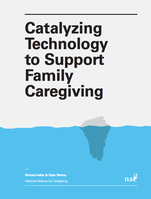Future Now
The IFTF Blog
Catalyzing Technology to Support Family Caregiving
Millions of Americans are currently providing care for a family member, friend, or neighbor, typically because of illness, injury, or frailty. Their efforts range from providing emotional support and helping with routine household tasks to carrying out complex medical procedures. Though those receiving care are of all ages, the amount of caregiving will certainly rise as our population gets older.
Until now, technology's contribution to supporting caregivers has been modest, even though it is playing a big role in many other aspects of life. Caregivers use the Internet as a source of information for the care they provide, but could technology play other, more meaningful, roles to help reduce caregiving burdens? If so, what might be done to accelerate innovation?
These questions were the focus of an expert roundtable held at our office in Palo Alto, California, on April 1, 2014—with sponsorship from IFTF, the California HealthCare Foundation, Kaiser Permanente, and Care Innovations.
We’re delighted to share the report from that event, Catalyzing Technology to Support Family Caregiving (pdf), which highlights steps to better support family caregiving through mobile, online, and in-home technologies. It includes six recommendations to inspire and guide industry and policymakers:
- Create better “concept maps” and more appropriate language to describe the varied and complex caregiving landscape.
- Continue to collect extensive data about the prevalence, burden, and impact of caregiving and the role of technology.
- Spur a broad national conversation on caregiving.
- Develop compelling business cases for employers and healthcare providers to support caregiving.
- Provide caregiving coaching as an integral component of all solutions.
- Inspire social conversations about caregiving to encourage more learning and support within families and communities.
Co-authors Richard Adler, an IFTF Distinguished Fellow, and Rajiv Mehta summarize these recommendations and also frame the issues for caregiving today, identify emerging technology solutions, and outline the systemic change beyond technology needed to support caregiving.
The report adds to our collection of new collaborations and research exploring the ways we can engage with technology to create a culture of health and well-being. At our 2014 annual Health Horizons research retreat, we looked to both technological and social shifts to holistically support four core facets of aging well—body, mind, wealth, and relationships. A few weeks later, we launched Technology Catalysts for Human and Economic Vitality 2030, a partnership with the Vitality Institute that maps how technologies may be catalysts to health and well-being between now and 2030.
Want to know more about IFTF's Health Horizons?
- Find out more about the program
- Download the 2014 research agenda and read about our spring conference
- Join us at our fall event and open house November 12-13
- Check out previous years' Health Horizons research
- Contact Dawn Alva (dalva@iftf.org




